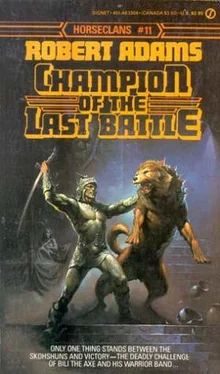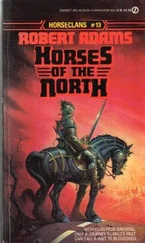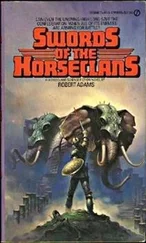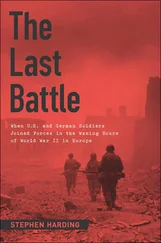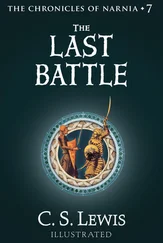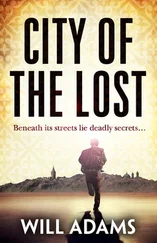The young man drew himself up to rigid attention. “Sir, I was aware of what you told his lordship you would do to any Skohshun messengers, aware of my fate if caught. If I’ve a choice, I would prefer the sword or the axe to the rope. I have made my peace with God, sir. I am ready to ... to die.”
Corbett’s throat contracted painfully around the still-present lump and he found it necessary to noisily clear it before he said, “Lord love you, lad, I have no intention of killing you. Give me your parole, and I’ll set you on a mount and let you ride back to the glen, after breakfast, in the morning.”
But Grey shook his head stubbornly. “I would that I could, sir, but I cannot. I have undertaken a grave responsibility and I shall not willingly rest or tarry until my obligations are discharged.”
Jay Corbett sighed. He should have known better, he reflected. Of course such a young man as Thomas Grey would not give a parole unless he intended to abide by its conditions.
The officer shrugged. “All right, Gumpner, we now have a prisoner. Get him fed and bedded down for the night ... under guard, of course. And please have the corpsman take a look at the stump of his leg, too. I’ll give long odds it’s rubbed raw and bleeding after all that walking on this abomination of a wagon track.”
As the mindspeak abilities of Sir Geros Lahvoheetos were at best marginal, the initial contact with Bili of Morguhn and all subsequent ones needs must be of a roundabout nature. Bili farspoke the prairiecat Whitetip, who then mindspoke one of the Kindred warriors who had ridden out in search of Bili with Geros, Hari Danyuhlz, who then spoke to Geros and mindspoke that night’s reply back to Whitetip for farspeak transmission to Bili. Even so, it was far and away faster and easier than would have been the only alternative—trying to get gallopers the full width of the plain through the Skohshun lines and back again the same distance.
“The battle is set,” beamed Bili, “for the second hour after dawn, eleven days from today, and I want your force to stay just where you now are until the last possible moment, and give yourselves just enough time to reach the battlefield by the third hour after dawn of that day. It is imperative that no one of you come out of those mountains, for if these Skohshuns even suspect your existence so close, they will surely call off the battle; the only reason they are willing to fight it at all is that they think to win it, considering that they outnumber us.
“Now when you attack them, Geros, whatever you do, don’t just charge in, hell for leather, and try to hack your ways through that pike hedge. That’s just what they will want you to attempt, and it cannot be done. No, sit off at easy dart range and let your archers and Ahrmehnee dartmen and the Kuhmbuhluhn axe throwers whittle the formations down a bit, disorganize the bastards, take out their front ranks, their sergeants and any officers you can spot and range. Then you charge.
“These Skohshuns seem to basically scorn missilemen of any sort and they number no archers in their ranks. They do have a few crossbowmen, prodmen and slingers, but hardly enough of them to worry about, and they will probably be on camp guard, anyhow. They have also three highly unusual, very long-range missile weapons called ryfulz which are invariably fatal and very accurate, so if you lose a few men at seemingly impossible distances, don’t be surprised.
“That’s all for now, Geros.
“Now, Whitetip, please mindspeak Count Sandee.”
Near noon of the day after the capture of Ensign Grey, the vanguard, hearing fast-approaching hoofbeats from up ahead, ambushed and captured another Skohshun. The man they hustled back to the head of the main column was about five years the senior of Thomas Grey, but looked and acted to be of the same breed and kidney.
Corbett questioned the galloper briefly. Again, he offered a parole that was courteously refused. So, then, he pushed on with two captive Skohshuns rather than one. Early the next morning, that number became three and the officer wondered if he might run out of men to guard the prisoners, if this pace continued. Like it or not, he might have to begin executing captured Skohshun messenger riders.
But the next stranger, brought in by Merle Bowley, would require no guard. He was another Ganik, he was armed with a Broomtown rifle and he was mounted upon a finely bred, most spirited riding horse. His name was Counter Tremain.
It had rained every nightlong for the best part of a week, and Bili hoped that the residents of the Skohshun camp—their tents and huts mostly burned up or holed by Kuhmbuhluhnburk engines—were thoroughly miserable. Although dry and well fed, he was none too happy himself, what with the endless rounds of inspections, supervisory duties, receipt of and evaluation of reports, arbitration of the seemingly endless disputes among members of the royal council and similar tedious minutiae of command. His days stretched from dawn until late into every night, so he sometimes slept in one of the side chambers of his huge suite rather than take the chance of awakening the twins and Rahksahnah at midnight or beyond.
For her own part, Rahksahnah was not overfond of her mate’s lengthy absences, either. She had become accustomed to the warm, familiar nearness of his big body whether sharing with him a campaign pallet, a camp bunk or a palace great-bed, and the inability to reach out and touch his flesh, to listen for his steady breathing, to lie with her nostrils full of the dear, unmistakable scent of him caused her to be even more wakeful than she ordinarily would have been through constantly listening with at least half an ear for the twins, who slept in their cradle in one of the side chambers with their wet nurse, a strapping peasant girl whose own baby had been born dead. Pah-Elmuh had used his mental accomplishments to ease the girl’s mind of that tragedy, so that she now was smiling and cheerful in addition to producing quantities of rich milk for the two ravenous young Morguhns.
The creature was again abroad, after an enforced four days of fasting. So weak was it become that it could barely place one huge paw ahead of the other, and the digestive organs within its shrunken belly were a gnawing, growling, ceaseless torment. They demanded food, instantly—hot, rich, red, still-quivering manflesh. But in its present sorry state, the creature knew without consciously thinking that it was no match for any adult man, armed or no. So it prowled the dark, benighted corridors and stairwells seeking prey less able to defend itself.
Finally, from far off, borne on air currents circulating in the drafty corridors and open stairwells, it caught the mouth-watering scent of blood, fresh-spilled blood, along with the scent of milk. The creature found previously unknown reserves of energy and, keen nose held high to keep the scents, it began to walk faster, following the odors back to their source, almost loping as they became stronger, only slowing its pace as the scent trail led it closer and closer to an area of corridors lit by chain-hung metal lamps and iron-sconced pine torches. Thereabouts, the blood-milk smells were almost overlaid with other smells, smells of danger to the enfeebled creature—adult men, several of them, along with the stinks of polished leather, oiled steel and, distantly or in very small amounts, a hint of something that bred a vague, ill-defined and uneasy dread in the furry breast of the hungry creature of the night.
But then that hunger drowned every other thought and emotion, saving only immediate caution in the stalk. This near, the creature could more closely identify the blood smell. It was moon-blood, and moon-blood meant a female twolegs, most of which were smaller and weaker than most males, thus more easily killed—a partial compensation for the lesser amount of edible flesh on such a carcass, such a compensation as the creature could appreciate in his present lack of full strength.
Читать дальше
